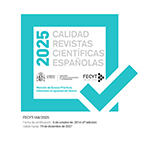El papel de las mujeres en los acuerdos de paz en Colombia: la agenda internacional
Resumen
Los acuerdos de paz en Colombia se han conformado como un referente internacional al poner fin a cincuenta y nueve años de conflicto armado en el país e incorporar nuevos instrumentos jurídicos que establece el marco sobre Mujer, Paz y Seguridad de Naciones Unidas. Así pues, esta transformación sobre las narrativas de la securitización está mediada por los relatos de las organizaciones de mujeres, que, junto con la Resolución 1325 del Consejo de Seguridad, han promovido su mayor participación en los procesos de negociación, así como la incorporación de un enfoque de género en los acuerdos de paz, logrando así romper con un espacio inicialmente masculinizado. A partir del examen de los distintos acuerdos de paz acontecidos en Colombia y las dinámicas de género que los atraviesan, el artículo evidencia cómo se ha logrado un cambio en las narrativas de género establecido en el discurso hegemónico, y cómo, en consecuencia, las mujeres se convierten en sujetos políticos necesarios para la consecución de la paz en Colombia.
Descargas
Descarga artículo
Licencia
La revista Política y Sociedad, para fomentar el intercambio global del conocimiento, facilita el acceso sin restricciones a sus contenidos desde el momento de su publicación en la presente edición electrónica, y por eso es una revista de acceso abierto. Los originales publicados en esta revista son propiedad de la Universidad Complutense de Madrid y es obligatorio citar su procedencia en cualquier reproducción total o parcial. Todos los contenidos se distribuyen bajo una licencia de uso y distribución Creative Commons Reconocimiento 4.0 (CC BY 4.0). Esta circunstancia ha de hacerse constar expresamente de esta forma cuando sea necesario. Puede consultar la versión informativa y el texto legal de la licencia.











